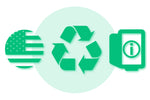
Plastic Waste and Greenwashing Threaten True Sustainability
, by Planet Green, 3 min reading time

, by Planet Green, 3 min reading time
In recent years, the concept of circularity has become a buzzword, especially in the context of plastic waste. However, the term's true essence has been lost in the cacophony of marketing strategies, leaving environmentalists and advocates for waste reduction uneasy. The disconnect between the idealized vision of a circular economy and the practical implementations, particularly in the plastic industry, raises concerns about greenwashing and the true commitment of corporations to sustainable practices.
The roots of the circular economy can be traced back to environmental scholarship in the 1960s and '70s, where thinkers like Kenneth Boulding emphasized the need for a closed-loop system to conserve finite resources. However, over the decades, the concept shifted from a holistic approach aimed at resource conservation to a more market-oriented model, often seen as a compromise between resource efficiency and profit.
The circular economy gained popularity among corporations and on the international stage, with influential entities like the Ellen MacArthur Foundation, the European Commission, the World Economic Forum, and others championing its cause. However, the lack of precise definitions has allowed the term to be co-opted for various agendas, leading to a cynical scramble for attention and funding.
While the circular economy should encompass the three Rs—reduce, reuse, and recycle—corporate visions often focus on the third R, particularly concerning plastics. Environmental groups argue that the term has become synonymous with "more plastics recycling," deflecting attention from the root issue: the overproduction and overconsumption of plastic.

A contentious aspect of the circular economy discourse is the promotion of chemical recycling as a solution for plastics. Despite endorsements from entities like the United Nations Environment Programme, independent investigations suggest that most chemical recycling projects face technical and economic hurdles, with many turning plastics into fuel—a process that contradicts the circular ideal.
Even conventional mechanical recycling struggles to create a truly circular system for plastics. The low recycling rates, limited recyclable varieties, and the inevitable downcycling of materials contribute to the perpetuation of the linear plastic life cycle that ends in landfills or incinerators.
Rather than forcing plastics into an ill-fitting circular economy model, there is a pressing need to address the expansion plans of the plastic and petrochemical industries. With projections indicating a tripling of plastic production by 2060, environmental groups advocate for a reduction in plastic production, urging U.N. member states to take decisive measures and supporting legislation at the national level, such as France's anti-waste and circular economy law.

One promising avenue within the framework of a circular economy is the practice of remanufacturing, a process that holds the potential to significantly reduce landfill waste and contribute to sustainable resource management. In the United States, a notable example of remanufacturing in the context of plastic waste involves the recycling and remanufacturing of ink cartridges. Remanufacturing plastic ink cartridges not only diverts these items from landfills but also provides a cost-effective alternative to the production of new, single-use plastic cartridges. By recycling and reusing plastics in the remanufacturing process, this approach aligns with the core principles of a circular economy, emphasizing the conservation of resources and the reduction of environmental impact. Embracing remanufacturing practices on a broader scale can serve as a tangible step towards achieving a more sustainable future, demonstrating the feasibility of circularity in everyday products and challenging the prevailing throwaway culture.
As circularity becomes synonymous with recycling, particularly in the context of plastics, it is essential to scrutinize the disconnect between rhetoric and action. True sustainability requires a reevaluation of the entire lifecycle of plastic, challenging the status quo of overproduction and pushing for comprehensive legislative changes.

When people talk about e-waste, the conversation usually centers on big-ticket items: cell phones, laptops, televisions, or kitchen appliances. But one of the most common...

Most people see a printer cartridge as a small, everyday item. But behind that small piece of plastic is a surprisingly large environmental cost. Every...

The phrase “circular economy” has become a buzzword in sustainability circles, but what does it really mean? In simple terms, it’s about designing products and...

For years, recycling ink cartridges often meant relying on office collection bins, retail drop-off points, or corporate programs tied to large accounts. But as more...